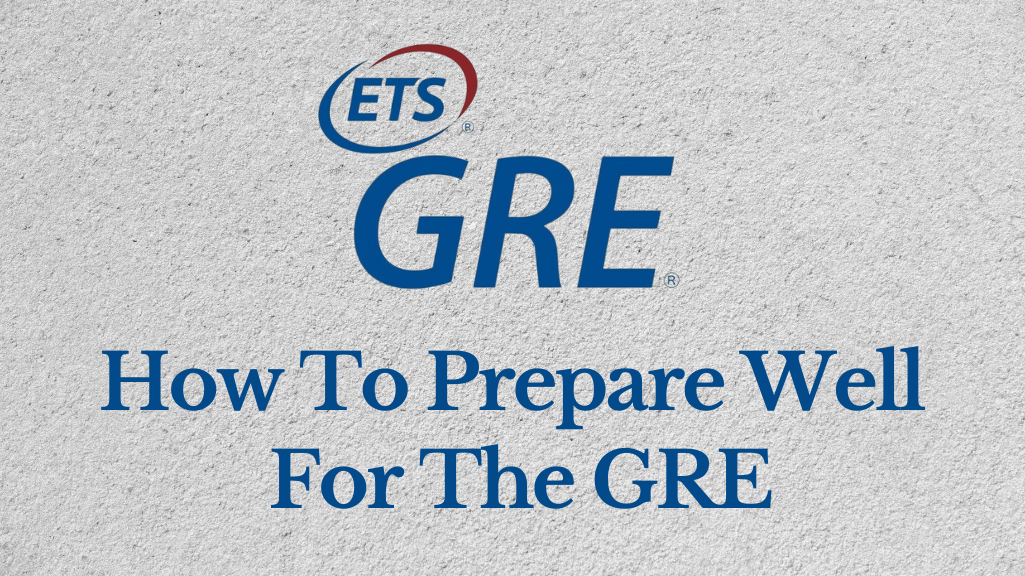This article will simplify GRE preparation, making it easy to understand and follow. Whether you’re just starting or want to improve your strategy, this guide covers everything you need to prepare successfully.
The GRE (Graduate Record Examination) is a key test for students applying to graduate schools, especially for Master's or PhD programs in the United States. It helps universities assess if you’re ready for advanced studies.
What Is GRE?
Before diving into preparation, it’s important to understand the structure of the GRE itself. The GRE is divided into three main sections:

- Verbal Reasoning
The Verbal Reasoning section measures your ability to understand and analyze written material, evaluate arguments, and synthesize information. It includes:- Reading Comprehension: Passages followed by questions that test your understanding.
- Text Completion: Sentences with missing words that you must fill in based on context.
- Sentence Equivalence: Pairs of words that create equivalent sentences.
- Quantitative Reasoning
The Quantitative Reasoning section tests your ability to solve problems using basic arithmetic, algebra, geometry, and data analysis. It includes:- Problem Solving: Traditional word problems and quantitative comparisons.
- Data Interpretation: Graphs, tables, and charts require you to interpret and analyze data.
- Analytical Writing
This section measures your ability to articulate complex ideas clearly and effectively. It consists of two tasks:- Issue Task: You’ll be presented with a statement and asked to take a stance, providing logical reasoning and examples.
- Argument Task: You’ll be given a brief argument and asked to evaluate its logic and reasoning.
Additionally, there’s a research section that is unscored, but its presence is designed to help ETS test new questions.
In the 2022-2023 period, about 319,100 individuals took the GRE, with a notable decline in U.S. test-takers and an increase among non-U.S. citizens.
Also look: A Step-by-Step Guide to Cracking IELTS/TOEFL for US Universities
Set Realistic Goals
The first step in your GRE preparation is setting realistic goals tailored to the requirements of the programs you’re applying to. Not all graduate schools demand sky-high GRE scores, so it's essential to do your homework and align your target score with your aspirations. Here's how:

Research GRE Requirements by Program
Find the average GRE scores for your desired graduate programs. Most schools publish this data on their admissions websites or program brochures.
Examples of GRE Score Expectations:
- Top-Tier Universities
Competitive schools like Harvard, Stanford, or MIT typically expect GRE scores in the range of 320–330 (combined Verbal and Quantitative).- Verbal: 160+
- Quantitative: 160+
- Analytical Writing: 4.5+
- Mid-Range Universities
Institutions such as the University of Texas, University of Illinois, or Boston University generally look for scores between 300–315.- Verbal: 150–155
- Quantitative: 155–160
- Analytical Writing: 3.5–4.0
- Lesser-Known Programs
Some programs may accept GRE scores as low as 290–300, especially in fields where GRE scores are less emphasized.- Verbal: 145–150
- Quantitative: 145–150
- Analytical Writing: 3.0
The majority of GRE test-takers are aged 18-22, comprising 53% of the total in 2022-2023.

Create a Study Plan
Break Down Your Study Timeline
The amount of time you have before your exam will significantly impact your study plan. Here’s how to approach your study plan:
- Three Months (Intensive Study)
- Daily Study: Aim for 3–4 hours of study per day.
- Weekly Practice: Take at least one full-length practice test each week to monitor progress.
- Review Mistakes: After every practice test, thoroughly review your mistakes to ensure you don’t repeat them.
- Six Months (Moderate Study)
- Daily Study: Aim for 1–2 hours of study each day.
- Weekly Focus: Devote each week to a specific subject area—Verbal, Quantitative, or Analytical Writing.
- Regular Practice: Take one full-length practice test every 2–3 weeks.
- One Year (Early Preparation)
- Monthly Study: If you have a year to prepare, study 2–3 times a week for 2 hours.
- Study in Phases: In the first few months, focus on strengthening your weak areas, and in the later months, focus on fine-tuning and taking full practice tests.
Use a Calendar to Keep Track
Create a study calendar that includes deadlines for completing practice tests, mastering specific sections, and revising key concepts. This will help keep you on track and ensure you don’t waste time on any one section for too long.

Gather Your Study Materials
There are countless GRE prep materials available, but choosing the right ones can make or break your preparation.
Official Materials
- ETS Official GRE Guide
This should be your first go-to resource. The Official Guide provides real GRE questions and full-length practice tests. - PowerPrep
PowerPrep is ETS’s free online tool that allows you to take full-length practice tests and review questions with explanations. It's a great way to familiarize yourself with the test interface. - ETS GRE Math Review
This document is specifically tailored for those looking to improve their quantitative reasoning skills. It’s free and available on the ETS website.
Popular Prep Books
- Manhattan Prep GRE Set
A comprehensive set of study materials, Manhattan Prep’s guides cover each GRE section in detail and offer a wealth of practice problems. - Kaplan GRE Prep Plus
Kaplan’s guide provides in-depth strategies and practice questions, along with a diagnostic tool to pinpoint your weaknesses. - The Princeton Review GRE Premium Prep
Known for its step-by-step strategies and comprehensive explanations, this book can help you build your skills from scratch.
Also check out: How To Find Your Professor For Masters/PhD in US
Online Resources and Apps
- Magoosh
Magoosh offers video lessons, practice questions, and study schedules that cater to a wide range of learning styles. - Quizlet
Use Quizlet for flashcards to help you memorize vocabulary words, formulas, and key concepts. - GRE Prep Club
A free online community that offers practice tests, tips, and a discussion forum.

Master Time Management
One of the most critical aspects of GRE preparation is learning to manage your time effectively during the exam. You have a limited amount of time for each section, and the clock can be a significant source of stress.
Practice Under Timed Conditions
It’s essential to practice taking GRE tests under timed conditions to simulate the real exam environment. Use official practice tests from ETS or other prep sources to learn to pace yourself.
Break Down the Sections
Here’s the amount of time you have for each section:
- Verbal Reasoning: 35 minutes per section, two sections
- Quantitative Reasoning: 40 minutes per section, two sections
- Analytical Writing: 30 minutes per task
In your study sessions, simulate these time limits, even when you're reviewing practice problems. Time yourself and resist the urge to linger on any one question for too long.

Focus on Weaknesses
As you begin your prep, it’s important to identify areas where you’re struggling. This will allow you to prioritize those sections in your study plan. For instance:
- Verbal Reasoning:
If you find yourself struggling with reading comprehension or vocabulary, allocate extra time to expand your vocabulary. Practice reading dense academic material to familiarize yourself with GRE-level texts. - Quantitative Reasoning:
If you struggle with math, focus on areas like data interpretation, algebra, or word problems. Consider using online tutorials or math apps if you need extra help with particular topics. - Analytical Writing:
If writing is a weak point, practice by writing responses to sample GRE prompts. Try to develop clear, logical arguments and pay attention to the structure of your writing.
Take Full-Length Practice Tests
Taking full-length practice tests is essential for gauging your readiness for the actual exam. Aim to take one every few weeks during your prep, especially as you get closer to your test date. These tests will help you:
- Track your progress: Review your performance on each test to see which areas still need work.
- Build endurance: The GRE is long, and you need to be able to stay focused and sharp for the full duration of the exam.
- Reduce test anxiety: Familiarity with the format will help reduce stress on test day.
Simulate Test-Day Conditions
When taking these practice tests, try to replicate test-day conditions as closely as possible. This means no interruptions, and take breaks only when allowed in the real test.
Get detail: Everything about Applying for Higher Studies in US | Low and High CG, GRE
Get the Right Mindset
Your mindset can make all the difference when preparing for the GRE. As you move through the process, keep a few key things in mind:
- Stay Positive: Test prep can feel overwhelming, but remember that your goal is gradual improvement. Celebrate small wins along the way.
- Don’t Cram: It’s tempting to try to cram everything into the last few weeks, but sustained, consistent study over time is much more effective.
- Take Care of Your Mental Health: Prepare effectively but don’t overburden yourself. Ensure you are getting adequate sleep, exercise, and relaxation to stay sharp. Take deep breaths if you start to feel overwhelmed, and pace yourself.
FAQs
1. What is the first thing I should do when starting GRE prep?
Start by taking a diagnostic test to understand your strengths and weaknesses. This will help you create a personalized study plan. Many test-prep platforms, like ETS PowerPrep, offer free initial tests to get you started.
2. Can watching movies or reading novels improve GRE Verbal skills?
Yes! Watching movies with complex dialogue or reading novels with rich vocabulary can help you understand context and word usage better. However, complement this with focused GRE-specific vocabulary practice.
3. Should I attempt harder questions first on the GRE?
Not necessarily. Start with easier questions to build momentum and confidence. Use the flag option to return to harder questions later if time permits.
4. Is handwriting important for the Analytical Writing section?
No. The GRE is computer-based, so typing speed and clarity matter more than handwriting. Practice typing essays to familiarize yourself with the interface and ensure you can complete responses within the time limit.
5. How do I manage burnout during months of GRE prep?
- Take regular breaks using the Pomodoro Technique (study for 25 minutes, rest for 5).
- Rotate between Verbal and Quant sections to avoid monotony.
- Incorporate activities like exercise or meditation to recharge.
6. Can listening to podcasts improve my GRE Verbal skills?
Yes, especially podcasts that focus on storytelling or academic topics. They help enhance your comprehension skills and expose you to complex sentence structures similar to GRE passages.
7. How do I improve my guessing strategy?
When guessing:
- Eliminate clearly wrong answers first.
- Focus on logic—sometimes context or patterns can guide your choice.
- Never leave any question unanswered; there’s no penalty for guessing on the GRE.
8. What if my math basics are weak?
Go back to fundamentals. Use resources like Khan Academy or GRE prep books to strengthen foundational topics like algebra, geometry, and statistics before tackling advanced questions.
9. Is it okay to skip practice on good days?
No, consistency is key. Even on busy days, spend at least 15 minutes revising vocabulary or solving a couple of questions to maintain momentum.
10. How does sleep affect GRE performance?
Sleep is crucial. Studies show that sleep enhances cognitive function and memory retention, both critical for GRE success. Avoid late-night cramming and ensure 7–8 hours of sleep, especially before the test.
11. Can I prepare for GRE Quant using just high school math books?
High school math books can help with the basics, but they won’t cover GRE-specific question formats. Use GRE prep materials to practice how questions are framed and learn test-specific strategies.
12. How can I improve my reading comprehension skills?
- Read challenging materials, like academic journals or editorials.
- Summarize each paragraph in one sentence while practicing.
- Focus on understanding the author’s tone and main idea rather than every detail.
